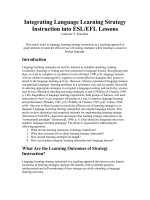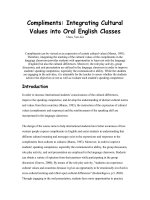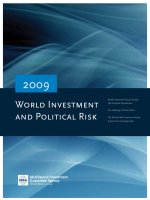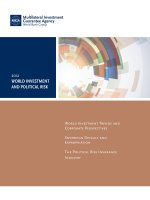Integrating political risk into ERM
Bạn đang xem bản rút gọn của tài liệu. Xem và tải ngay bản đầy đủ của tài liệu tại đây (2.32 MB, 36 trang )
Integrating Political Risk
Into Enterprise Risk Management*
*connectedthinking
Table of Contents
2
Political Risk as Opportunity
6
Why Politics in Business Matters:
Turning Uncertainty into Risk
• Globalisation and Contagion
• Offshoring
• Security Concerns Rising
• Energy Dependence
14
Anticipating Sources of Risk
• Macro-Level Risks
• Country-Level Risks
• Domestic Politics
• Identifying Key Actors for Regulatory Reform
20
Assessing Risk
• How Likely Are the Risks You Face?
• Anticipating and Responding to Shocks
• A Unique Methodology
• Political-Risk Analysis Strategies
• Scenario Planning
• Timing Risk: Capitalising on
Market Misreading of Relative Political Risk
• Preparing for Uncertainties
26
Integrating Political Risk into an
Enterprise Risk Management Process
• Managing Risk to Attain Objectives
• The Political Risk Assessment
• Integrating the Process
30
D
PricewaterhouseCoopers and Eurasia Group
Authors
Why Political Risk Matters
A Letter from Samuel A DiPiazza Jr and Ian Bremmer
Enterprise Risk Management (ERM) has entered the mainstream of corporate consciousness over the past decade.
Corporations and financial institutions globally have spent
a great deal of money to develop and implement systems
and processes to assess and manage risk more effectively.
The basic “no surprises” mission of ERM is to help protect
companies from preventable losses. Identifying, measuring, and continuously monitoring risks are the core
competencies of ERM.
Yet, beyond capital protection, ERM can serve a more
strategic function. In understanding clearly where and how
risk arises in a business, management can drive
higher-quality returns to the bottom line.
Now for the first time, PricewaterhouseCoopers (PwC),
a market leader in the field of ERM, and Eurasia Group,
a leader in political-risk research and consulting, have
joined forces to develop a framework to help executives
understand the political-risk dimension within the context
of ERM’s core competencies.
stated policies when confronted with internal and external
challenges. Changes in the regulatory environment, local
attitudes to corporate governance, reaction to international
competition, labour laws, and withholding and other taxes,
to name but a few, may all be influenced by hard to discern shifts in the political landscape. Political risk even
incorporates a government’s capacity and preparedness
to respond to natural disasters.
PwC and Eurasia Group have brought together a team of
experts to build a Political Risk Assessment (PRA) diagnostic and monitoring methodology that enables companies to
isolate and assess the contribution of political risk to their
overall risk profile. The complete Political Risk Assessment
also incorporates recommendations that enhance a company’s internal capacity to manage these risks, as well as
to identify and capitalise on unexploited opportunities.
While many companies have developed metrics that estimate how their profitability might be impacted under
varying financial scenarios, most have struggled to find
a comparative and rigorous means of incorporating the
range of outcomes that might arise from the political risk
inherent in their international business activities. Political
risk relates to the preferences of political leaders, parties,
and factions, as well as their capacity to execute their
The interrelation and interdependencies of global markets
will continue to increase. Businesses that reach for new
manufacturing and sales opportunities in countries far
from their home base and experience are truly at the
forefront of globalisation. At the same time, they are
vulnerable to the reactions of countries that seek to
temper the pace and impact of globalisation on their
institutions and workforce. PwC and Eurasia Group’s
political-risk assessment offering helps business leaders
to understand the nature of political risk and its impact
on their international investments, and to seize the opportunities it affords.
Samuel A DiPiazza Jr
Chief Executive Officer
PricewaterhouseCoopers International Limited
Ian Bremmer
President
Eurasia Group
Integrating Political Risk into Enterprise Risk Management
1
Political Risk as Opportunity
Globalisation is a process of rising acceptance
of political risk in search of greater economic
rewards. Economic success has bred acceptance
of ever-greater political-risk exposure.
2
PricewaterhouseCoopers and Eurasia Group
Global automakers have pinned their hopes on China as a
way to save an industry plagued by surplus capacity.
Original equipment manufacturers (OEMs) are building
assembly plants there to achieve cost savings and bolster
their bottom lines. Often pressured by OEMs, component
manufacturers are following closely behind. Automakers
are also seeking to penetrate China’s domestic market—
the fastest-growing auto market in the world.
local political and market dynamics affect foreign ventures.
China, for example, holds tremendous promise as an automotive manufacturing centre and market, but CEOs may
be unaware of social, regulatory, and energy issues around
the next curve in the road. Political-risk analysis allows
leaders to contemplate not just broad, easily observable
trends but also the nuances of society and the quirks of
personality that can affect a venture’s success.
Although the cost savings can be significant, and the lure
of China’s dynamic domestic market infectious, China’s
auto sector poses considerable regulatory and commercial
risk. China is increasingly pressuring foreign investors
to transfer technology to local producers, which could
erode the patent protections and competitiveness of wellmeaning investors. But this is not the only risk to the
automotive sector.
Looking forward, even investors in “stable” countries must
be concerned with political risks that arise in emerging
markets. For example, consider the current concern about
rising interest rates in the United States. Countries with
positive current account balances, like China and Japan,
buy US debt, which in turn supports low domestic interest
rates. Any political move that shifts foreign investment
preferences away from US bonds, such as China’s decision to liberalise the renminbi’s peg to the dollar, could
upset the US balance of payments and cause an increase
in American interest rates and inflation.
As they focus on shifting growth from exports to domestic
consumption, China’s leaders may withdraw tax benefits
for foreign investors. Infrastructure bottlenecks and strong
upward pressures on government-controlled electricity and
fuel prices also create considerable uncertainty around
manufacturing efficiency and operating expenses. At the
same time, sporadic fuel shortages and worsening urban
gridlock inject ambiguity into forecasts for domestic auto
demand growth. In short, low-cost manufacturing and vast
potential domestic demand are offset by uncertainty in
regulatory and infrastructure capacity. This makes China a
potentially higher-risk, higher-reward investment destination.
CEOs and business strategists seeking to invest in China
and other emerging markets routinely consult economicrisk analysts. But basing global investment decisions on
economic data without considering the political context is
like making diet decisions based on calorie counts without
reading the nutritional labels. While most companies are
already charting the murky waters of globalisation, many
corporate leaders lack a framework for understanding how
4
PricewaterhouseCoopers and Eurasia Group
What might shift foreign governments’ preferences for US
debt? Will countries that are debtor nations to the United
States grow fast enough to afford higher interest rates?
How quickly and smoothly can emerging markets tied to
the United States adjust their monetary policy? Being
aware of political dynamics abroad helps even the most
local companies anticipate macro-level shifts that could
affect their interests.
Politics is everyone’s business. Global financial markets
are more interconnected than ever before. Offshoring and
outsourcing have radically altered industry cost structures,
forcing more and more companies overseas. Even companies without intentions of expanding abroad are dependent
on international flows of raw materials and capital.
Evaluating a company’s exposure to risky political events,
and assessing their impact, should be key components of
any company’s ERM strategy.
Frightened Capital? The Case of China
Economic theory argues that capital should chase the highest return on investment, and returns should be highest in
countries with relatively low levels of capital stock where investment is needed. Why then do emerging markets like
China enact policies that send funds to capital-rich countries like the United States?
Two explanations are commonly given to account for this trend, and both are driven by politics.
• First, money flows to wealthy countries because political risks are lower in established democracies with predictable
regulatory and political processes.
• Second, high savings in emerging markets is increasingly used to balance current accounts across the Pacific Ocean.
By bolstering the dollar, China is preserving American consumers’ ability to buy their goods.
But the key explanation is likely rooted in domestic Chinese politics. By sending dollars back to cover the United
States’s global current account imbalance rather than converting them into renminbi, China is serving its export-oriented
sector and protecting its fragile financial industry with a weaker currency. The political consequences of correcting this
imbalance could be tremendous, but over time it will have to happen. Political dynamics will steer the impacts of the
correction.
Political Risk:
Any political change that alters the expected outcome and value of a given
economic action by changing the probability of achieving business objectives.
Integrating Political Risk into Enterprise Risk Management
5
Why Politics in Business Matters:
Turning Uncertainty into Risk
Politics influences how markets operate.
Often the most unpredictable economic events
are political in origin, the result of flagging
political willingness or capacity to maintain a
consistent and predictable economic environment.
6
PricewaterhouseCoopers and Eurasia Group
Today, four trends dominate the global investment environment: the interconnection of financial markets, increased
reliance on offshoring, deteriorating national security, and
energy dependence. Anticipating the risks associated with
each of these trends requires asking the right questions
about how institutions’ and leaders’ preferences determine
policy choices and, in turn, economic outcomes.
Politics can make many economic decisions look foolish in
hindsight. This is especially true in countries where autocratic leaders seem to personally steer policy and where
quantitative data is often adulterated. Yet it also applies to
developed nations where targeted lobbying efforts can
sway policy decisions. How does one separate newspaper
hype from the underlying forces that affect the business
8
PricewaterhouseCoopers and Eurasia Group
environment? When do economic figures fail to tell the
whole story? How does a company predict the severity of
shocks, like unforeseen transfers of political power or the
2004 tsunami, on its overseas holdings? Conducting a
political-risk analysis turns uncertainty into calculable risk.
Because businesses are often affected by political decisions in the countries where they operate, at home and
abroad, all companies factor the political environment into
planning scenarios. However, political risk can seem so
amorphous that many business leaders lack a framework
for evaluating their exposure. But like other elements of
enterprise risk, political risk has systematic components
that can be isolated by analysts who understand variation
across political systems.
East Asian Crisis Rapidly Spreads Across the Pacific
Right up to the 1997-98 East Asian financial crisis, economic data revealed few risks to further investment in Southeast
and East Asia. In retrospect, the immediate, underlying cause of the Asian financial crisis was economic: a sudden outflow of funds occurred after the collapse of speculative bubbles throughout the region, largely in the imprudently
regulated financial and real estate sectors. Political conditions, however, magnified the effects of the crisis. Weak political
institutions were unable to implement policies that would have prevented risky lending and were incapable of convincing
markets that they could implement credible policies in reaction to the growing crisis. As a result, the crisis took more
than a year to run its virulent course, threatening markets from Latin America to Russia.
Investors worried about how governments across East Asia would respond to the crisis. Political-risk analysts would
have asked questions to help them gauge national reactions, such as:
• Which governments were most stable domestically or had elections approaching?
(Both of these factors mitigated the political pressures brought on by the crisis.)
• Where were social tensions highest, with the consequent potential for unrest?
• Which governments could credibly respond with what were perceived by markets to be proper policies?
Analysis of the answers would have helped investors foresee that:
• Mahathir Mohammad, Prime Minister of Malaysia, would survive the crisis due to his stranglehold on domestic politics
and the inclusion of a substantial portion of the population as beneficiaries of the single-party political regime.
• The Philippines and South Korea would manifest public discontent largely through nonviolent elections.
• Thailand’s fragmented democracy would provide the country the flexibility it needed to alter its constitution
to stabilise itself.
• In Indonesia, too few people had any incentive to defend President Suharto’s highly centralised regime
from destruction.
Integrating Political Risk into Enterprise Risk Management
9
Globalisation and Contagion
Global financial markets have become inextricably linked,
which raises the likelihood that shocks in one country will
cascade across a region. “Shocks” can be internal to a
country, like the death of a dictatorial leader, or external,
like a natural disaster. As the connections between the
financial crises in East Asia, Russia, and Latin America
made clear, it is no longer enough for a company seeking
to mitigate the effects of shocks to simply diversify.
Shocks can touch holdings in geographically dispersed
countries. When they do occur, fixed-asset investments
face longer-term risk than do more liquid investments.
Crisis Contagion
The East Asia crisis provides a clear example of how investors can misperceive risk when diversifying investments
across regions. East Asia’s capital outflow and the subsequent currency devaluations of the East Asia crisis put significant pressure on the currencies of Brazil and Argentina, both of which had adopted fixed-exchange-rate regimes that
were susceptible to currency speculation.
In 1999, Brazil’s currency peg was the first to fall. Brazil had employed a crawling-peg exchange rate that was more
vulnerable to speculative attacks than was Argentina’s, which was tied to the American dollar. The Brazilian Social
Democratic Party (PSDB) leader, Fernando Henrique Cardoso, was elected president in 1994 on a campaign that
focused on stabilising the economy. Consequently, the government was reluctant to permit currency devaluation in
the run-up to Cardoso’s reelection campaign in late 1998. Shortly after the election, economic authorities could no
longer sustain the currency’s value. The subsequent devaluation considerably weakened Cardoso’s second administration, diminishing the capacity of his government to embark upon a legislative reform agenda.
Argentina’s currency resisted devaluation longer than did Brazil’s, as its more rigid fixed-exchange rate gave speculators a bit less room to maneuver against it. While Argentina’s and Brazil’s fixed-exchange-rate regimes reduced
the possibility of speculative attack on their currencies, they also increased the economic costs of devaluation. After
successive and failed attempts to cut back fiscal expenditures, Argentina’s currency suffered significant devaluation
in 2001, generating a severe economic recession. The devaluation led to a short period of serious instability and the
successive resignation of three Argentinian presidents.
10 PricewaterhouseCoopers and Eurasia Group
Offshoring
Any shift abroad in productive capacity can be considered
offshoring, from manufacturing auto parts in Mexico to
providing financial analysis in India. Businesses export jobs
to locations where labour is cheaper but not necessarily
the cheapest. Businesses optimise along a variety of
dimensions, including access to raw materials, human capital, and predictability of the regulatory environment. Where
cost and quality of the workforce are comparable, the
political environment can determine investment decisions.
The Case of Slovakia: When Political Environment Sways Investors
Central and southeastern European companies compete head-to-head for lucrative Western investments. Their proximity
to Western Europe and comparable labour costs often mistakenly make them seem broadly similar. However, differences in each country’s actual cost structures and political developments can have far-reaching effects on companies’
location decisions.
Beginning in 1998 and continuing following his re-election in 2002, Slovakian Prime Minister Mikulas Dzurinda was able
to form a multi-party center-right coalition favourable to pro-growth policies. This political development allowed Slovakia
to make a decisive break with the authoritarian and anti-integration prerogatives of the previous government.
The Dzurinda government delivered a series of key market reforms, reducing the corporate income tax in 2002 from
40 percent to 25 percent, and instituting an across-the-board flat-tax structure in 2004. In addition to the benefits of
the 19 percent income-tax rate, the new system was seen as less complex than those in countries like Poland. For Kia
Automotive, which chose to locate a manufacturing facility in Slovakia instead of Poland, the predictability and clarity
of the system was an important factor.
Several large-capitalisation companies have had success in negotiating attractive incentives in central and southeastern
Europe. Yet, in Slovakia’s case, it was the broader political climate that enabled the construction of a pro-growth coalition, which in turn instituted business-friendly policies. At the same time, one election is not enough to guarantee that a
favourable business climate endures.
Integrating Political Risk into Enterprise Risk Management 11
Security Concerns Rising
Understanding political risk is increasingly important as
terrorism and conflicts in the Middle East and Northeast
Asia generate new security-policy concerns. For better or
worse, the United States is now a major driver of international risk, and Washington’s new willingness to preempt
threats to American security and national interests has
changed risk calculations everywhere. Companies must
identify whether domestic, regional, or global security
threats will affect the cost of doing business. How will
those costs compare with doing business elsewhere?
South Korea is a prominent example of how security
concerns can overshadow a country’s economic outlook.
Placed in Western Europe or North America, South Korea
would fit in as just another industrial democracy. But
caught between regional and increasingly antagonistic
goliaths—Japan and China—and facing its politically unpredictable and well-armed counterpart to the north, South
Korea has security risks that cloud the economic decisions
of potential investors.
Escalating Tension in the East China Sea
The dispute between China and Japan over control of natural-resource rights in the East China Sea threatens to spill
over into political conflict that could damage economic interactions within the region and beyond. Japan claims that
the exclusive economic zone (EEZ) boundary between China and Japan is the median line, equidistant between the
Chinese mainland and the Okinawan archipelago. China claims that its EEZ is the entire continental shelf extending
from the Chinese mainland nearly to Okinawa.
The contested region between these two imaginary lines has been left alone by both governments until recently.
Now China has begun development of the Chunxiao natural gas field on what is the uncontested Chinese side of
the median line, but in a field that Japan claims could cross that line into disputed territory.
Decisions on this dispute are being driven in part by national politics. If Japan determines from its test drilling that
the gas reservoirs the Chinese are developing do not cross the median line, Japan will likely refrain from pursuing
development, at least until May 2009, when the UN Law of the Sea process will receive submissions of precise claims
made by all coastal countries. But if Japan determines that the Chinese are currently exploring gas reservoirs that span
the median line, the Japanese could push forward with development. If there are attempts to disrupt experimental
drilling, tensions could quickly arise.
12 PricewaterhouseCoopers and Eurasia Group
Energy Dependence
All energy-importing countries share an interest in diversifying their oil supply, both away from an increasingly unstable
Middle East and toward alternative sources of fuel. Common
objectives in energy coordination include increasing efficiencies in energy transfer and use and promoting infrastructure
efficiencies that avoid bottlenecks and diminish regional
variation in energy costs. Understanding how local, regional,
and global energy concerns can affect investment decisions
requires country-specific knowledge of how political actors
will respond to energy shortages.
The Response to Venezuela’s 2002 Oil Strike
In December 2002, a general strike in Venezuela, a major supplier of oil to the United States, brought crude production
and refining activity to a halt. The strike lasted several weeks, but its impact on production was considerably longer
due to field damage and the loss of expertise that occurred as a result of a massive purge at the national oil company,
Petroleos de Venezuela. Although US refiners, faced with a sudden loss of feedstock supply, expected a release of crude
oil from the Strategic Petroleum Reserve, the Bush administration refrained from taking such a step. Saudi Arabia, which
had initially taken a wait-and-see attitude, eventually agreed to make up for the disruption in Venezuelan supply, but
Saudi relief took months to arrive. US crude oil inventories plummeted, which drove up prices.
Integrating Political Risk into Enterprise Risk Management 13
Anticipating Sources of Risk
The Committee of Sponsoring Organizations (COSO) of
the Treadway Commission’s ERM framework encourages
companies to measure risks and make trade-offs based
on their risk appetites. For investors exploring emerging
markets, the potential for rapid political shifts makes
calculating those trade-offs a moving target. Global and
country-level politics can act independently or interactively
to alter the economic environment.
14 PricewaterhouseCoopers and Eurasia Group
Macro-Level Risks
Macro-level risks are widely discussed in the media. Such
risks include terrorism, energy-price volatility, political
instability in the Middle East, weapons proliferation,
Northeast Asian security instability, and the role of China in
the global marketplace. Political-risk analysis differs from
reporting because analysts sift through the information
overload to inform business leaders of how these events
will directly affect financial markets and long-term foreign
investments. Analysts who study world leaders’ will and
their capacity to respond to macro-level shifts are also
able to anticipate ripple effects across countries.
Political Marketplace Risk Rising in Russia
Over the past five years, the investment climate in Russia has undergone a major transformation. From January 2000
to June 2003, Russia reached a post-Soviet-era peak in terms of political stability. President Vladimir Putin increased
investor confidence by pushing through a number of important structural reforms. He created a stable political environment through his steady leadership style and control of parliament, forged a relationship with big business that was
relatively transparent, and eliminated interregional barriers to trade, which helped reduce the Yeltsin-era asymmetrical
relationships between Russia and the states of the former Soviet Union that had skewed markets. The combined
impact of these policies was the informal blessing of major joint ventures between Russian and foreign companies,
such as TNK-BP, and the continuing post-1998 economic recovery. This seemed to suggest that Russia was moving
in the right direction.
However, these reforms did not completely institutionalise a market democracy in Russia, as the state still maintains
a large role in the Russian economy, especially in the all-important natural-resources sector. Recent moves among
powerful leaders on the national and regional level—such as the dispute at the beginning of 2006 between Russia
and Ukraine over natural gas—suggest a renewed emphasis on statist policies.
16 PricewaterhouseCoopers and Eurasia Group
Political stability is linked to economic vitality
Looking at a map highlighting many of the world’s developing
nations, the countries with the strongest economies also
tend to be the most politically stable. This is true even where
political stability is a result of a strong, yet market-oriented,
autocratic regime.
O C E A N
A R C T I C
ARCTIC OCEAN
Ust-Olenek
Khatanga
Barrow
Volochanka
GREENLAND
Alta
Antipayuta Dudinka
Norilsk
Belaja Gora
Murmansk
Kiruna
Vorkuta
Fort
Yukon
Lulea
Port
Radium
Fairbanks
Nome
ICELAND
Baker
Lake
Skelleftea
Vaasa
Torshavn
Mirnyj
NORWAY
Fort
McMurray
Stockholm
Churchill
Red
Deer
Kamloops
Spokane
Seattle
Provo
Reno
Denver
Las Vegas
Tucson
Bayonne
Detroit
Baltimore
Dallas
New York
Philadelphia
Charlotte
Birmingham
New
Orleans
ATLANTIC
GREECE
CUBA
DOM. REP.
MAURITANIA
SENEGAL
Dakar
GAMBIA
NICARAGUA
Araouane
U. A. E.
VENEZUELA
Georgetown
Paramaribo
Bogota
ECUADOR
GUYANA
SURINAME
FRENCH GUIANA
Sao Tome
Belem
Fortaleza
Talara
OCEAN
Porto Velho
Trujillo
Kinshasa
Luanda
Goiania
Belo Horizonte
Campinas
PARAGUAY
Asuncion
Curitiba
Mogadishu
INDIAN
OCEAN
BOTSWANA
Cairns
Antananarivo
Mackay
Alice Springs
Mbabane
Bloemfontein
Maputo
Carnarvon
Tolanaro
NEW CALEDONIA
AUSTRALIA
Brisbane
SWAZILAND
Geraldton
LESOTHO
Kalgoorlie
Umtata
OCEAN
URUGUAY
Buenos Aires
Tennant Creek
Learmonth
MADAGASCAR
Bourke
Cook
SOUTH AFRICA
Rosario
Valdivia
FIJI
Broome
Port Hedland
ZIMBABWE
Pretoria
Porto Alegre
Port Moresby
MALAWI
Windhoek
Gaborone
Luderitz
Dili
COMOROS
MOZAMBIQUE
Harare
NAMIBIA
PAPUA
NEW GUINEA
EAST TIMOR
Likasi
Walvis Bay
Rio De Janeiro
Sao Paulo
ARGENTINA
Concepcion
OCEAN
INDONESIA
Jakarta
TANZANIA
Lusaka
CHILE
Santiago
Davao
Singapore
ZAMBIA
ANGOLA
Brasilia
Sucre
Antofagasta
PHILIPPINES
BRUNEI
Kuala Lumpur
MALAYSIA
KENYA
Nairobi
Huambo
Salvador
Cuiaba
La Paz
Manila
Ho Chi Minh City
Colombo
RWANDA
BURUNDI
Kananga
VIETNAM
KAMPUCHEA
Phnom Penh
Dar es Salaam
Barreiras
BOLIVIA
Bangkok
Cochin
UGANDA
Kampala
CONGO
Vientiane
THAILAND
SRI LANKA
ETHIOPIA
Yaounde
DEM. REP.
OF CONGO
SOMALIA
TAIWAN
Hanoi
LAOS
Rangoon
Madras
Ningbo
Wenzhou
Taipei
Hong Kong
MYANMAR
Pune
INDIA
Fuzhou
Xiamen
Shantou
Nanning
Kolkata
Nagpur
Ulhasnagar
(Bombay) Mumbai
Huangshi
Yueyang
Guiyang
DJIBOUTI
Addis Abbaba
Recife
BRAZIL
Cachimbo
Lima
Muscat
BHUTAN
Varanasi
(Calcutta) BANGLADESH
Dhaka
PACIFIC
Sendai
Tokyo
JAPAN
Shanghai
Zigong
Dukou
NEPAL
YEMEN
Sanaa
Hefei
Mianyang
Agra
Waw
Libreville
GABON
Brazzaville
Sao Goncalo
PERU
ERITREA
Asmara
SOUTH
KOREA
Qingdao
Kaifeng
Xian
New Delhi
Allahabad
Ahmadabad
Surat
OMAN
Khartoum
SUDAN
EQUATORIAL GUINEA
SAO TOME & PRINCIPE
COLOMBIA
Quito
Manaus
CHAD
Bilma
Niamey
Lanzhou
CHINA
Jaipur
SAUDI
ARABIA
NÕDjamena
NIGERIA
GUINEA BISSAU
GUINEA
BENIN
Abuja
GHANA
Conakry
TOGO
IVORY
Freetown
Porto Novo
COAST
CENTRAL AFRICAN
SIERRA LEONE
REPUBLIC
CAMEROON
Monrovia
Lome
Accra
Abidjan
LIBERIA
Bangui
Malabo
Caracas
PANAMA
COSTA RICA
PAKISTAN
Sapporo
Benxi
NORTH KOREA
Pyongyang
Dalian
Seoul
Chengdu
Multan
Shiraz
Aswan
Al Jawf
Beijing
Yinchuan
Taiyuan
Xining
Golmud
QATAR
Jilin
Fuxin
Baotou
Qiemo
Hotan
Islamabad
Juzno Sachalinsk
Harbin Jixi
Changchun
Dalandzadagad
IRAN
Basra
KUWAIT
Riyadh
NIGER
Bamako
BURKINA
Kashi
TAJIKISTAN
AFGHANISTAN
Makkah (Mecca)
Nouakchott
HAITI
HONDURAS
MONGOLIA
Hami
Kabul
EGYPT
LIBYA
JAMAICA
BELIZE
GUATEMALA
EL SALVADOR
Ashgabat
Esfahan
IRAQ
Sabhah
Qiqihar
Yumen
TURKMENISTAN
Bakhtaran
Baghdad
Cairo
ALGERIA
Korla
Tehran
SYRIA
ISRAEL
Djanet
Bishkek
KYRGYZSTAN
Tashkent
Adana
Nicosia
CYPRUS
LEBANON
MALI
Mexico City
Altay
Urumqi
Alma Ata
TURKEY
Izmir
Athens
Tripoli
Reggane
Balqash
Aralsk
Khabarovsk
Ulaanbaatar
Hovd
Karamay
Ouargla
WESTERN
SAHARA
THE BAHAMAS
Ulan Ude
Qaraghandy
UZBEKISTAN
AZERBAIJAN
ARMENIA
JORDAN
Canary Islands
Tampa
Havana
Petropavlovsk-Kamchatskij
Astana
KAZAKHSTAN
GEORGIA
Ankara
Jacksonville
Houston
MEXICO
Novosibirsk
Irkutsk
Atbassar
Krasnodar
Constanta
MACEDONIA
ALBANIA
Tunis
TUNISIA
Algiers
Omsk
Rudnyy
ROMANIA
Bucharest
BOSNIA
YUGOSLAVIA
BULGARIA
Gibraltar
Rabat
Casablanca
MOROCCO
Bratsk
Aktyubinsk
Frunze
MOLDOVA
AUSTRIA
SLOVENIA
CROATIA
Rome
Naples
Barcelona
SPAIN
Sevilla
Lisbon
Norfolk
Atlanta
ITALY
FRANCE
Toulouse
Valladolid
Madrid
PORTUGAL
Washington D. C.
Memphis
Albuquerque
Boston
Buffalo
Porto
St. Louis
San Francisco Oakland
SWITZ.
Montreal
Ottawa
MilWawkee
Chicago
Omaha
Kansas City
Scottsbluff
Ufa
Kuybyshev
Volgograd
UKRAINE
SLOVAKIA
Krasnojarsk
Chelyabinsk
Saratov
Kiev
HUNGARY
Nantes
Duluth
Minneapolis
U. S. A.
Kazan
Voronez
Warsaw
Krakow Lviv
Bodaybo
Sverdlovsk
Izevsk
Tol Yatti
Orol
BELARUS
POLAND
CZECH
Paris
Amos
Timmins
Kirov
Gorkiy
Moscow
Gdansk
Berlin
GERMANY
LUX.
Grand Forks
Butte
Twin
Falls
NETH.
U. K.
London
Cork
BELGIUM
Portland
Los Angeles
San Diego
Dublin
IRELAND
Labrador City
Moosonee
Brandon
Magadan
Vologda
Jaroslavl
Rostov
Minsk
Prince
Albert
Saskatoon
Swift
Current
Williston
Riga
LATVIA
LITHUANIA
Kaunas
Copenhagen
Sunderland
Jakutsk
Nizhnevartovsk
Perm
Novgorod
Flin
Flon
Calgary
Vancouver
St. Petersburg
ESTONIA
DENMARK
Thompson
Prince
George
Tallinn
Inukjuak
C A N A D A
Grande Prairie
Prince Rupert
Syktyvkar
Helsinki
Oslo
Fort
Chipewyan
Bear
Lake
Dawson Creek
PACIFIC
FINLAND
Ostersund
Reykjavik
Cordova
Juneau
RUSSIA
Archangelsk
Sangar
Nuuk
Rankin Inlet
Anchorage
Unalaska
Batagay
Igarka
SWEDEN
Cape Town
Port Elizabeth
Perth
Adelaide
Montevideo
Canberra
Melbourne
Sydney
Auckland
Neuquen
Wellington
NEW ZEALAND
LEVEL OF STABILITY
Comodoro Rivadavia
Port Stanley
VERY
LOW
LOW
Dunedin
MEDIUM LOW
MEDIUM
MEDIUM HIGH
HIGH
Integrating Political Risk into Enterprise Risk Management 17
Country-Level Risks
By their nature, emerging markets are places where political decisions have a greater effect on markets than
economic trends, thus diminishing the value of employing
economic guideposts to investment decisions. In politics,
risks are more difficult to identify, to measure, and to
hedge. Consequently, investors ranging from hedge funds
to extractive industries are extremely concerned with the
risks of nationalisation, weak legal systems, corruption,
and regulatory stability. Corporations exposed to these
risks must weigh the trade-offs associated with investing
in China versus Brazil or Germany versus Japan.
Corporations doing business in or with some of the world’s
fastest-growing economies, especially China and India,
require a framework for navigating the challenges associated with working in high-growth countries, which typically
have rapidly evolving political and legal frameworks.
Companies that outsource labour, for example, would
benefit from understanding the degree to which local
18 PricewaterhouseCoopers and Eurasia Group
government regulates and intervenes in the labour market.
Likewise, it is crucial to be aware of existing social tensions that may result in work stoppages or civil unrest.
In other instances, intellectual-property rights may be an
issue of concern. Not only is it essential to know that
a country has regulations in place to protect intellectualproperty rights, but it is even more important to know
if those laws are enforced and what legal avenues are
available for addressing disagreements. Political-risk professionals consider a wide range of issues like these in
order to assist companies in anticipating and mitigating
such challenges.
Domestic Politics
Investment abroad requires local knowledge. Local politicians often have considerable sway over the tenor and
ease of foreign direct investments. And they often face
incentives that are distinct from those of a “rational” economic actor, because they are judged on their ability to
meet political goals such as attracting investment to their
region. Sovereign-debt analysis conveys, for example,
whether a country can remain financially able to pay its
bills, but it cannot reveal whether a country will be
politically capable of covering its debts when payments
compete with social-programme spending that keeps
constituents happy.
There are three types of domestic political stability:
policy, government, and regime. The likelihood of these
factors changing over time varies greatly, and with them
so does political risk. Regime instability occurs when
the institutions of government or the rules of the political
game change. Government instability arises when the
actors who control the institutions of government change.
Policy changes can occur when the preferences of
those who control government change; when those who
control the institutions of government change; or when the
institutions of government are altered, which in turn
changes the preferences of those who control government.
Identifying Key Actors for
Regulatory Reform
There are three principal actors involved in all structural
reforms: executives, legislators, and political and economic
actors outside the legislative process. Analysing possible
legislative-process trajectories requires that one identify
which legislators stand firmly on an issue, which remain
undecided or can be swayed, and which actors are capable of influencing legislators.
Knowing which legislators are undecided is critical for
predicting the passage of reforms. Political profiles of
each legislator unveil political allegiances and vulnerability
to pressure. Important factors that can reveal personal
preferences include education, former jobs, electoral constituency, and posts within a party or legislature.
An Example from Mexico: Deputy Luis Antonio Ramirez Pineda
Luis Antonio Ramirez Pineda, from the Institutional Revolutionary Party (PRI), is publicly against most structural reforms.
His stance reflects his political roots in Oaxaca, whose legislators tend to contest reform, and his father’s leadership
position in the PRI’s agrarian sector, which also opposes reform. However, Ramirez Pineda is on the legislative finance
committee, which has to manage many fiscal problems produced by the present system. In addition, he has a BA
in Economics from Instituto Technologico Autonomo de Mexico (ITAM), and so he may be receptive to certain reform
arguments. He is also a pivotal figure for advocates of reform, because his position within the party allows him to
influence other PRI members.
Integrating Political Risk into Enterprise Risk Management 19
Assessing Risk
Stable industrial democracies can face politically
driven economic problems, as Japan did in the 1990s.
By contrast, countries such as China, with a high
potential for instability, can become magnets for external
investment, despite poorly specified regulatory and
legal protections. Both China and Japan are attractive
investment targets. Their risks to investors vary in
magnitude and timing.
20 PricewaterhouseCoopers and Eurasia Group
How Likely Are the Risks You Face?
Understanding how this trade-off is managed across
countries is an important facet of anticipating variation in
political risk.
Russia’s 1998 financial crisis and Brazil’s election of
President Luiz Inácio “Lula” da Silva reveal how changes
in the individuals who control governing institutions affect
a country’s “stability.” The same concerns influenced markets while Hu Jin-tao’s consolidation of power in Beijing
was incomplete. By contrast, unexpected shifts in power
do not have a substantive effect on markets in “stable”
countries, which are characterised by enduring state institutions, meaningful opportunities for citizens to participate
in politics, and predictable political procedures.
Decisiveness represents the capacity to change policy
rapidly, and it is necessary in the face of any crisis. But
decisiveness implies unpredictability in that leaders
who demonstrate a high level of decisiveness can quickly
shift the political environment.
Countries with high levels of policy stability will stay the
course when times are good and avoid bad policy choices.
Of course, countries with political institutions that promote
policy stability can find themselves in dire straits when
policy change is necessary but the political system finds
it impossible to adapt. For example, Argentina saw
indicators of a financial crisis as far back as 1998, three
years before its default, but political constraints prevented
legislators from enacting reforms that would have taken
pressure off the peso.
Anticipating and Responding to Shocks
To assess a nation’s stability, an analyst looks at two factors: the capacity of political leaders to implement the
policies they want even amid shocks, and the ability to
avoid generating shocks of their own. A country with both
capabilities will always be more stable than a country with
just one. Countries with neither are the most vulnerable to
political risk. In political-science parlance, these translate
into “decisiveness” and “credibility” or “predictability.”
These factors represent a difficult trade-off: how can a
regime optimise both decisiveness and policy stability?
A regime’s market orientation is equally important
to understanding how a country will respond to shocks.
22 PricewaterhouseCoopers and Eurasia Group
HIGH
CRONYISM
LOW
Policy Stability
Market Orientation
COMPETITION
Predictable Political Risk
China
Low Political Risk
United States
Unpredictable Political Risk
Nigeria
Ecuador
Predictable Political Risk
United Kingdom
The preferences of political leaders can lean toward helping
friends or promoting market competition. All countries strike
a balance between competition and cronyism, but political
systems tilt the scales. The nearer that balance is struck
to favouring competition, the less likely politics will influence
market outcomes and impinge on economic decisions.
By comparing a country’s level of policy stability to its
market orientation, one can assess the predictability of
government responses to shocks. For example, because
of the United Kingdom’s high concentration of government power in the House of Commons, the country can
enact rapid policy shifts, a sign of low policy stability.
But the country’s high market orientation means that the
process leading up to change tends to be transparent
and that new policies are generally economically rational.
By contrast, China’s consolidation of political power in
Beijing creates a high level of policy stability, but it may
mean that policies are sometimes influenced by
non-market factors.
A Unique Methodology
Eurasia Group’s methodology marks the first systematic
effort to integrate political-science theories and financialmarkets expertise into robust, comparative frameworks for
use by both financiers and corporate leaders.
Knowledge of variation in political behaviour across sectors or regions within a country is an invaluable resource
for wise planning. Certain political figures, ministries, and
regulatory departments matter more than others, and it
is not always immediately evident who pulls the strings in
any given sector or on any particular issue. Political-risk
analysts possess an intimate knowledge of the countries
they cover and the underlying institutional make-up that
adds necessary context and direction.
Regulatory Impact
Eurasia Group brings together political scientists with a
broad range of country expertise, which enables them to
provide comparative country analysis. PwC brings together ERM specialists and business advisors with deep
sector experience to recommend practical approaches
for mitigating identified risks, enhancing opportunity, and
evaluating alternative courses of action.
HIGH (>30%)
+++
Long-term
12-24 months
HIGH
MEDIUM
LOW
EU (++)
Directive would open internal
market in services
India (++)
Pension fund reform could
move forward (++)
Brazil (++)
Regulatory streamlining
would systematise processes
across sectors
Germany (++)
Labour law reforms driven by new
center-right government
Russia (++)
MEDIUM (15-29%)
Brazil (++)
Energy investment reform in
hydrocarbon sector
Brazil (++)
Consumers could win
telecom victory
TIMEFRAME
Probability
+
Short-term
0-6 months
Eurasia Group’s Regulatory Riskwatch service is one
example of the ways in which the company provides
a comparative and forward-looking platform for thinking
about risk. Regulatory Riskwatch estimates three key
dimensions of regulatory change: impact, probability of
the regulatory change, and time horizon. By considering
these elements, business leaders can adjust strategy to
deflect adverse affects on operations or take advantage
of opportunities.
LOW (0-14%)
++
Medium-term
6-12 months
Law on subsoil usage
making progress
Japan (++)
Postal savings and insurance
reform heading to the Diet
Russia (++)
Tax reform could reduce
uncertainty for business
Turkey (++)
Rapid progress on EU
competition chapter negotiations
on non-tariff barriers
Poland (++)
Downstream energy
regulatory changes
Hungary (++)
New VAT regime implemented
Integrating Political Risk into Enterprise Risk Management 23









